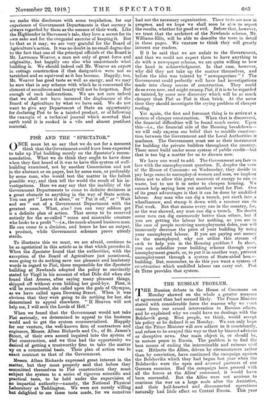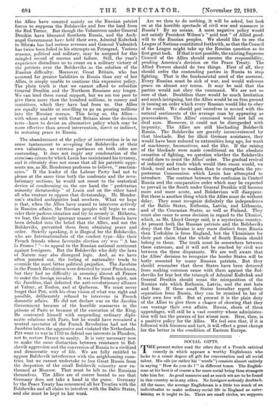THE RUSSIAN PROBLEM. T HE Russian debate in the House of
Commons on Monday showed on the whole a greater measure of agreement than had seemed likely. The Prime Minister stated with considerable force the reasons why we must cease from our armed intervention in Russian affairs, and he explained why we could have no dealings with the Bolshevik gang. Most people, we think, would accept his policy as he defined it on Monday. We can only hope that the Prime Minister will now adhere to it consistently, and refuse to be swayed this way or that by biassed advisers or deceptive news. Our main object is, or should he, to restore peace in Russia. The problem is to find the best means of ending the interminable and ruinous civil war. Hitherto the Allies, driven by circumstances rather than by conviction, have continued the campaign against the Bolsheviks which they had begun last year when the Bolsheviks were the open and avowed partners of our German enemies. Had the campaign been pressed with all the forces at the Allies' command, it would have been successful. But the Allies were not anxious to continue the war on a large scale after the Armistice, and their half-hearted and disconnected operations naturally had little effect on Central Russia. This year the Allies have counted mainly on the Russian patriot forces to suppress the Bolsheviks and free the land from the Red Terror. But though the Volunteers under General Denikin have liberated Southern Russia, and the Archangel Government have held their own, Admiral Koltchak in Siberia has had serious reverses and General Yudenitch has twice been foiled in his attempts on Petrograd. Various reasons, political and military, may be assigned for this mingled record of success and failure. Still, the year's experience disinclines us to count on a military victory of the patriots over the Bolsheviks as the solution of the Russian difficulty. Moreover, Great Britain, who has assumed far greater liabilities in Russia than any of her Allies, is simply unable to continue this expensive policy. The plain truth is that we cannot afford to subsidize General Denikin and the Northern Russians any longer. We can lend them moral support, but we are too poor to give them more than the hundred millions, in money and munitions, which they have had from us. Our Allies are equally unable or unwilling to go on pouring millions into the Russian morass. This being so, the Allies— with whom and not with Great Britain alone the decision rests—have to devise an alternative policy which may be more effective than armed intervention, direct or indirect, in restoring peace to Russia.
The abandonment of the policy of intervention is in no sense tantamount to accepting the Bolsheviks at their own valuation, as extreme partisans on both sides are contending. It does not imply any condonation of the atrocious crimes by which Lenin has maintained his tyranny, and it certainly does not mean that all his patriotic opponents are, as Mr. Henderson professes to believe, " reactionaries." If the leader of the Labour Party had not to please at the same time both the moderate and the revolutionary sections, he would not resort to the oratorical device of condemning on the one hand the " proletarian minority dictatorship " of Lenin and on the other hand all who venture to oppose that dictatorship. Mr. Henderson's studied ambiguities lead nowhere. What we hope is that, when the Allies have ceased to intervene actively in Russian affairs, the Russian peoples will begin to consider their parlous situation and try to remedy it. Hitherto, we fear, the densely ignorant masses of Great Russia have been deluded into the belief that the Allies, and not the Bolsheviks, prevented them from obtaining peace and order. Strictly speaking, it is illogical for the Bolsheviks, who are Internationalists of the crudest typo—like their French friends whose favourite election cry was " A has la France ! "—to appeal to the Russian national sentiment against foreigners. But the Bolsheviks who defy the laws of Nature may also disregard logic. And, as we have often pointed out, the feeling of nationality tends to override the most bitter political prejudice. The Jacobins in the French Revolution were detested by most Frenchmen, but they had no difficulty in arousing almost all France to resist the foreign invader. It was the French spirit, not the Jacobins, that defeated the anti-revolutionary alliance at Valmy, at Toulon, and at Quiberon. We must never forget that Pitt, with his clear vision of what was right and possible, deliberately refused to intervene in French domestic affairs. He did not declare war on the Jacobin Government because of the horrible massacres in the prisons of Paris or because of the execution of the King. He contented himself with suspending ordinary diplomatic relations with Paris, but he would have remained a neutral spectator of the French Revolution had not the Jacobins taken the aggressive and violated the Netherlands. Pitt went to war in 1793 to defend our interests in Flanders, not to restore France to sanity. It is very necessary now to make the same distinction between resistance to Bolshevik aggression and the conversion of Russia to a civilized and democratic way of life. We are fully entitled to oppose Bolshevik interference with the neighbouring countries, but we cannot undertake to free Great Russia from the despotism of the small Bolshevik minority now enthroned at Moscow. That must be left to the Russians themselves. The Allies are of course bound to see that Germany does not take a hand in the game. Germany by the Peace Treaty has renounced all her Treaties with the Bolsheviks and all claim to interfere with the Baltic States, and she must be kept to her word. Are we then to do nothing, it will be asked, but look on at the horrible spectacle of civil war and massacre in Russia ? By no means. A mere negative policy would not satisfy President Wilson's " acid test " of Allied goodwill to the Russian peoples. We should like to see the League of Nations constituted forthwith, so that the Council of the League might take up the Russian question as its first great task. If that is not possible, the existing Supreme Council of the Allies should assume the responsibility, pending America's decision on the Peace Treaty. The Allied Powers should do two things. First of all, they should order the contending parties in Russia to stop fighting. That is the fundamental need of the moment. Every Russian must be sick of war, and would welcome peace on almost any terms. It may be said that the parties would not obey the command. We are not so sure of that. Doubtless there would be much hesitation and much intriguing, but the Allies would be on firm ground in issuing an order which every Russian would like to obey if he could. We should put' ourselves in accord with the natural sentiments of the average man by appearing as peacemakers. The Allies' command would not fall on deaf ears. Moreover, it could not be disregarded with impunity. The Allies are still blockading Bolshevik Russia. The Bolsheviks are gravely inconvenienced by that blockade. But for illicit German assistance, they would have been reduced to extremities long ago, for want of machinery, locomotives, and the lIe. If the raising of the blockade were made conditional on the absolute cessation of fighting, we question whether the Bolsheviks would dare to resist the Allies' order. The gradual revival of industry and trade which would then ensue would, we think, tend rather to weaken than to strengthen the preposterous Communism which Lenin has attempted to introduce. The contrast between the confusion in Centre] Russia and the comparative order which may be expected to prevail in the South under General Denikin will become more and more acute, and Bolshevism will disappear. But there is another thing which the Allies must do without delay. They must recognize definitely the independence of the Baltic States, Esthonia, Latvia, and Lithuania, and of the Caucasian States, as well as Finland. They must also come to some decision in regard to the Ukraine, which, as Mr. Lloyd George said, is a mysterious country. At present both the Russian patriots and the Bolsheviks deny that the Ukraine is any more distinct from Russia than Yorkshire is from England, but the Ukrainians for their part claim that the whole of South Russia should belong to them. The truth must lie somewhere between these extremes, and it will not be reached by civil war between the three disputants. We are well aware that the Allies' decision to recognize the border States will be hotly resented by many Russian patriots. But they should remember that these Staten have been deterred from making common cause with them against the Bolsheviks for fear lest the triumph of Admiral Koltchak and General Denikin should mean the reimposition of the Russian rule which Esthonia, Latvia, and the rest hate and fear. If these small States hereafter regret their separation from Russia, they can be reunited to her of their own free will. But at present it is the plain duty of the Allies to give them a chajice of showing that they can manage their own affairs. Russia, shorn of these appendages, will still be a vast country whose administration will tax the powers of her wisest men. Here, then, is a positive policy for the Allies. We feel sure that, if it is followed with firmness and tact, it will effect a great change for the better in the condition of Eastern Europe.







































 Previous page
Previous page